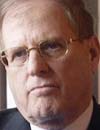- Tom Bettag
Former executive producer, Nightline, CBS Evening News - John Carroll
Former editor, Los Angeles Times - Jeff Fager
Executive producer, 60 Minutes - Ted Koppel
Former anchor, Nightline - James O'Shea
Editor, Los Angeles Times - David Westin
President, ABC News
Once it was realized that you could make a lot of money with news -- mostly in the form of news magazines and not necessarily hard news -- that turned the business completely. ... The news divisions were turned into people who really produced what some people have called "entertainment posing as news" -- good storytelling about murders, about mysteries, about lurid sort[s] of things that make great television. We started doing what I think is entertainment posing as news very successfully, and making a lot of money and filling that entertainment gap in prime time. ...
The biggest detrimental change [I've seen in the industry] is that people have realized they can make a lot of money with news and asked the news division, "Do what you can to maximize profits." ... It is now a profit center, and in the conflict between public service and making a profit, profit is winning out. That's the biggest change.
Serious news may not be the number one thing that Americans want, but Americans want it. ... It's a very good niche, and it's our niche. It's what we know how to do. It has the interest of the public and a high social purpose. Social purpose isn't valued as much in business today as it was back when the newspapers were locally owned. ... But the paper had a larger purpose than simply to crank out more money this year than it did last year. Unfortunately, the purpose of the paper has been diminished under this form of ownership. ...
Let me read you something that Ted Koppel said: "We're now judging journalism by the standards that we apply to entertainment, giving the public what it wants, not necessarily what it ought to hear, what it ought to see, what it needs. It may prove to be one of the greatest tragedies in the history of American journalism." Or as [editor] Dean Baquet at the L.A. Times -- before he got fired -- said to us, my job is to "give people broccoli," not just what they want to see.
Well, my job is to do both. It's a little bit arrogant of us to say we're the ones [to] give the viewer only what they need, as if there isn't more in our world. A combination of the two is more accurate in terms of what we do, which is that we try to do what's important and make it interesting, but we also try to add some life to that. 60 Minutes was created, if you go by how [creator] Don Hewitt remembers it, that Life magazine is part of the inspiration, and Life magazine covers the world in every aspect, from the circus to the war. ...
... [What do you make of the pressure to make news programs more "entertaining" to appeal to bigger audiences?]
... I happen to believe that it's perfectly reasonable for the entertainment divisions of every television outlet out there -- networks, cable, satellite -- to appeal to the tastes of their audience. That's what they have to do. They are businesses. News organizations are a little different. First of all, in the old days, the FCC [Federal Communications Commission] still had teeth and still used them every once in a while. And there was that little paragraph, Section 315 of the FCC code, that said, "You shall operate in the public interest, convenience and necessity." What that meant was, you had to have a news division that told people what was important out there. And I just don't necessarily believe that showing me what my pets are doing when I'm not at home to see them falls under that category. ...
To the extent that we're now judging journalism by the same standards that we apply to entertainment -- in other words, give the public what it wants, not necessarily what it ought to hear, what it ought to see, what it needs, but what it wants -- that may prove to be one of the greatest tragedies in the history of American journalism. ...
But isn't there a pressure on newspapers to go or feature other areas that are, in a sense, more entertaining, because they are losing advertising; you are losing subscribers? So, for example, it's a natural that the Los Angeles Times does more in-depth coverage of Hollywood.
But I think that's good; I think Hollywood was undercovered [by the Times] in the first place. But I don't think anybody's sitting there and saying, "Let's go cover Hollywood so we can get more revenue." I think people are saying, "Let's go cover Hollywood because we aren't doing a good enough job covering Hollywood." And if we're doing our job right, somebody else can probably get revenue on that, but my decisions can't be driven by where we're going to get revenue. My decisions have to be driven by, where are we going to get readership?
So you don't see a big threat to the newspaper industry, and the Los Angeles Times in particular?
There is a threat that if we don't expand online, and if we don't cover our region better, then we become irrelevant to people here. ... Are there pressures? Of course there are pressures. There are cost pressures all over the place, and that's because of natural economic forces that are beyond your and my control. But I don't think that means we're doomed. ...
The Chicago Tribune, before the merger, tried to go local -- hyperlocal, right?
Right.
Did it work?
It was a disaster. No, that's overstating it; it wasn't a disaster. [It] didn't work -- I mean online. We tried to go hyperlocal online with something called Digital Cities, and we put people out in the suburbs, and we put people out in all these little towns, and they gathered all this information so you could go online on what I think was then Chicago Online, and you could find out the school lunch menu and all this [stuff] they all talk about.
And nobody came. They said: "Sorry, that's not what we expect from the Chicago Tribune. We expect something different from the Chicago Tribune. If we want that kind of information, we'll go to the Pioneer Press weekly newspaper where they have all that stuff. And what we want from the Chicago Tribune," what we learn is, "is more look at the region: ... If I have an environmental problem in Arlington Heights, is it better or worse than what's happening in Oak Park?"
That was the sort of information they were expecting from us. So in terms of going online and becoming hyperlocal, that didn't work. Now, what did work is, in some cases, we did carve out about eight zones to the paper, and we would produce a locally produced metro section for each of those zones. ... But I don't think that's what everybody's referring to as hyperlocal. ...
When we broadcast this, The Washington Post is going to unveil a new hyperlocal operation, particularly in the suburbs of Washington. They have brought in Rob Curley, who was working in Kansas and then in Naples, Fla., to run these operations. So in many ways The Washington Post is sort of similar to the Los Angeles Times. It has a large metro regional area but has to cover the nation and, to a certain extent, the world. But you're not going to go in that direction. Is that what you're saying? ...
I don't know what they mean by hyperlocal. Does that mean that they're going to put reporters in all these places? I don't know. I couldn't afford to do that. ...
I think you can take a reporter or a team of reporters and put them in a region, and you can put some database people with them, and they can build sites where you can link and you can get very specific local information. But you have to say: "This is unedited. This is what you would get if you went up to the school board and asked for it." But if you want to read about what it all means, ... you're going to come to the Los Angeles Times.
Now, to me, that's good local reporting. I don't know if it's hyperlocal or if it's linked or whatever it is, but it's good local information, and this Los Angeles Times can provide that, and it will.
But when I talk to people on Wall Street or to investors in Chicago, they all say the same thing: that the Los Angeles Times in particular has to give up its bureau in Cairo, has to give up the idea that it's a national and international player. It can still have some people, but it has to redeploy its resources into this regional or metropolitan area and give up that image of itself as one of the three or four big national newspapers in the United States.
And I guess I disagree with Wall Street and with the people. Do we have to cover this area best? Yes, but I don't think that covering Los Angeles and doing a better job on local coverage means that you have to give up anything. You can do that by simply redeploying and continuing to be very aggressive on a national and global scene, if you want to call it global.
So you're saying they don't know what they're talking about?
Yes. ... The people on Wall Street have to do a better job of giving accurate information to investors, because the stuff they give you in their annual reports is a bunch of pap. Since when did they become the people who ... are the gods of journalism? They don't know anything about newspapers. ...
Well, they're the owners, or they represent the owners. And they are the ones who advise people who make these large investments. And they'll turn around to you and say, "A major newspaper just sold at discount for, like, 30 percent less than it was purchased for by its owner, because you're not doing the kind of coverage that people want."
Well, if they were so smart, why did they pay 30 percent too much for it? I mean, they're the ones that paid all the money for it. They're no [font] of wisdom either. I'm just saying that Wall Street is not the be-all and end-all of journalism. ...
But, Mr. O'Shea, the Tribune Company bought the Times Mirror Company.
Right.
And today the combined company is worth what Tribune Company paid for Times Mirror. Those are the people who are setting that price.
And they were the ones that set the original price, too; they were the ones advising us to pay too much for it. We paid too much for the company, and we're paying the price for that now. That doesn't mean that the world is at an end. ...
So you disagree with Wall Street.
Yes.
Do you disagree with John Carroll, the former editor, who says that because of what's been going on, the very soul of newspapers in the United States is being threatened by this economic crisis?
Yes, I agree with that: The soul of the newspaper industry is being threatened. That doesn't mean it's gone; it doesn't mean that you can't revive it. You've got to sit down and say: "OK, the soul is threatened. So what are we going to do to solve it?" You can't just sit there and say: "The soul is threatened. The soul is threatened. The soul is threatened." Yeah, we all know that. But what are we going do about it? That's the question: How do you get out this? How do we turn this around? How do we take everything that we do every day, which has got a lot of value -- and a lot more value than I think Wall Street is placing on it -- how do you turn that around?
How do you sit down and say to yourself: "OK, we are having troubles. We are losing readership in print, and yet people are buying us online. So how do we [amass] that audience?" ... I can give a large portion of the people in Los Angeles interested in sports, because they read my sports section. But I can also take my Lakers columnist or my Lakers beat reporter, and I can deliver to you, online, everybody that's interested in the Lakers, because I'll build a page around those columnists and around that expertise. That's got to be an audience that's of interest to an advertiser, somebody who would really like to be able to reach that targeted audience. How do you blend those two to create more revenue than you created when you had this one and this one apart?
I think you can do that. That's the way you've got to go in the future, and I think the Los Angeles Times is going to show everybody that they're wrong. ...
… Has the standard for what qualifies as news changed, primarily because of the pressure of profits and ratings?
No. The standard has changed, and it's broadened, not lowered. Because I will find you what you would perceive as a noble, serious news piece to match every one of the examples that you pick out of what you find ignoble. So it's broadened, not lowered.
I'm not saying it's ignoble, by the way, I didn't say that. I'm saying it's different; it's not news.
It's changed because there are a wider number of outlets. … The Web has increased it geometrically, just in terms of the amount of material on it. So absolutely it's broadened: There are more topics we cover; there's a wider range of topics we cover. Now, again, I would say to you that for just about every one you find, I could probably find something in a prominent national newspaper and/or a national newsweekly that, if not the same subject, would be of the same ilk. …
We have 31 hours of programming, plus we have radio 24 hours a day, plus we have now our Web site. So there's a wider range of topics covered, absolutely.
Back in 2000, you said, "If we don't add a younger audience, sooner or later our audience is going to die."
True.
That's true of any business, really.
True. …
Is that why you hired Leonardo DiCaprio or had Diane Sawyer do a story on Elian Gonzales?
No. Let me take those two different issues. First of all, I don't believe in programming for a younger audience. When I had some responsibility for entertainment programming, I didn't believe it either there, either. … Frankly, as far as news programming goes now, I've always said internally, if you want to reach more younger people, reach more people, period, and some of them will happen to be younger. I just don't believe in the segmentation, that we can direct a program at that particular age group. I don't believe it.
Leonardo DiCaprio was simple. I wanted to do a Primetime documentary on the environment. Leonardo DiCaprio was going to be the chair of Earth Day that year, and the idea was if we had Leonardo DiCaprio we would get, yes, a bigger audience, that's right, because he was a big name. … In retrospect, would I do it again? No. Not because of Leonardo DiCaprio. He was doing it out of the goodness of his heart for the right reasons; he cared about the environment, which is not a bad reason. I was doing it for the right reasons. I wanted to do something on the environment that would get a broader audience. But in retrospect, it caused much more furor than it was worth, and it was a mistake. I wouldn't do it again.
Why did it cause such a furor?
Well, because as it turned out, Leonardo DiCaprio ended up sitting down with the president of the United States and doing what looked like a formal interview, which was never my intention, certainly. As soon as I heard there was any possibility of that, I said, "You cannot do that, that's a mistake," in part because it's not fair to Leonardo DiCaprio; it's not what he's trained to do. It's not what he does for a living. …
But it got done and the question is, do you air it or do you not air it? It caused a furor because journalists are very concerned about their profession and making sure that other people don't pretend to be journalists and poach on their profession. And it caused a stir largely because people within ABC News were very upset. And I understand why they were upset.
Because entertainment values were encroaching on journalism values.
Well, no.
No?
No. No. It was an entertainment figure that could draw an audience. But the point was to portray true things that were vetted through the editorial process. It was not to present an entertainment show. If you go back and look at the documentary, you won't confuse it with an entertainment program. Trust me. It was not an entertainment program. Frankly, it wasn't even all that entertaining. It was a factual program. But it was a mistake, there's just no two ways about it; I admit to that. …
![News War [site home page]](../art/p_title.gif)













